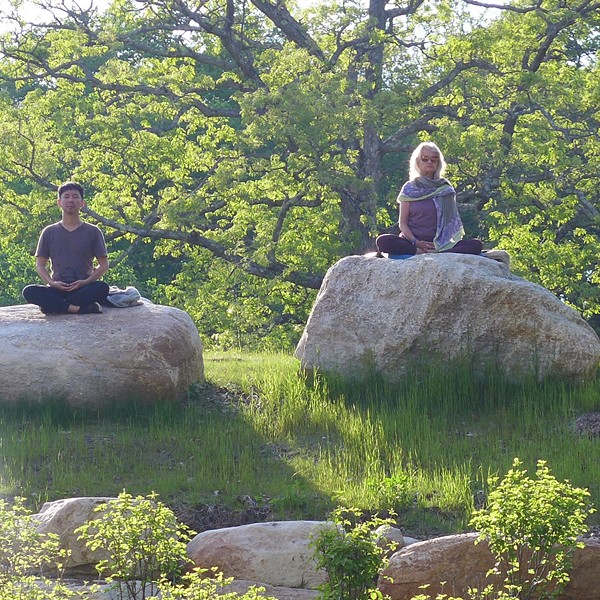How do we break out of that?
RT: We must see anger as an addictive emotion, or even an addiction—and the first step to conquering an addiction is to see that it is harmful. This is where Sharon comes in really powerfully with her self-awareness methodologies; you understand the mechanisms of your mind by observing it and seeing the way thoughts arise when your emotion gets kindled and you think, This is horrible, this is unacceptable, I'm going to flip out now. You get to see how that works in your mind and you are able to intervene. Then there are the mind transformation practices the Tibetans are so good at: You use the adversity, the thing that would make a normal person flip out, to change yourself internally—to develop your patience, your tolerance, your ability to withstand difficulties without losing control of yourself, and even turn those adversities into an advantageous energy that enables you to develop a kind of inner strength. The next step is developing what I call cool heroism, where you can be quite forceful and energetic in righting wrongs and preventing harm against yourself or others, yet you never lose your cool, you always have the best judgment, you even have a sense of humor, and you do it happily, you remain joyous, even dealing with adversity. That's, of course, practically enlightenment, but every degree that we reach is a kind of enlightenment. We have this ability. Human beings are very intelligent and have a great power of self-awareness. Once we get over the brainwashing idea that we're just creatures of habit and there's nothing we can do about overcoming this emotional reaction, this rigidity of self-identity that we have, as we get over that we realize that we can be responsible for how we are, what we think, say, and do. We can change it for the better, and we can have a much happier life.
SS: When you're using mindfulness you might realize, well, I screamed at somebody last week and it didn't work out that well. Maybe I have other options for trying to get what I want. It's not that you have to back down, be a doormat. It's not that you can't get your point across, or that you can't be strong or fierce. But if you're overcome by anger, you're actually not going to see many options. With anger, you get tunnel vision, and you may be less likely to get what you want in the end because of your reactive state.
Do we need to repress our feelings?
SS: Bob and I don't mean to say that you should suppress your feelings or pretend you're something you're not—that would be quite counterproductive—but to understand that there's a possibility to make a shift that serves our own well-being, which is a very important thing. It's not just feeling a little better and having some energy. It's having the energy to care about others and to be generous ourselves, and to make a contribution to the world. If you're depleted, exhausted, and overwhelmed, that's not going to happen. When we make a shift that serves our own well-being, we start to understand that we don't have to be so bound to the past, and maybe vengefulness is not as strong as we were once taught, and compassion is not really weakness.
RT: Don't repress your anger, but be aware of it, and come to understand how the mind works. We can look at the mind and say, I don't have to freak out about this. Then I'll just be hurting myself more. And if I get angry at the person who hurt me, they're going to hurt me worse. One begins to develop the ability to maintain judgment, rather than act habitually with screaming or fighting. Eventually, we get to see that anger is just energy. As long as you remain joyous—which means that you express anger neither internally or externally, because you understand that anger is a trick to trap you into behaving like a robot—then you can use that energy another way. You can use it creatively.
What about modern psychology's answer to anger and other difficult emotions?
RT: Modern psychology has really gone down the tubes to materialism, where it's just prescribing some sort of mood-altering drug and doing neuroscientific research to see what sort of brain stimulation you can have. The overall drive of industrial capitalism is that individuals are helpless to take care of themselves and have to rely on a substance, an authority, some other thing, instead of learning to become aware of themselves and cultivate themselves. We're trying to reencourage people, and I think it's part of a self-help movement, or self-responsibility movement, in the country and in the world. The people who won't eat the crappy food produced by Archer Daniels Midland or Kellogg, the GMO or Monsanto clients and so on, and who look carefully into their diet and don't take the mind-altering drug from the shrink who can't get paid for talking to them but just for prescribing these expensive drugs. The people who move out from that and start thinking for themselves, managing their minds, doing yoga to manage their body. That's what I call a self-responsibility movement. No one book is going to solve the whole problem, but if it helps turn people in this direction, that's why we're doing it.
Where do we go from here?
RT: The key is to develop harmony amongst ourselves and loving relationships, and connectedness and self-restraint and detachment, and a sense of freedom in the mind. We can't have in this century another violent revolution where the revolutionaries just take over the levers of power and then turn out to be worse than the previous people. We have to have a joyful revolution, person by person. A fun revolution. Not fun by depending on some consumer product, but fun by developing knowledge of how your own mind and body work. A joy revolution.

















